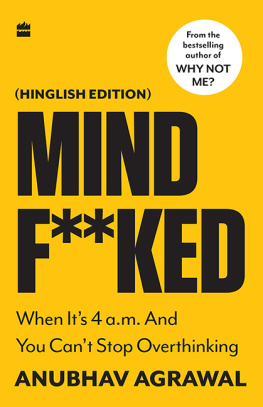Random House - Mindf*ck
Here you can read online Random House - Mindf*ck full text of the book (entire story) in english for free. Download pdf and epub, get meaning, cover and reviews about this ebook. year: 2019, publisher: Random House, genre: Politics. Description of the work, (preface) as well as reviews are available. Best literature library LitArk.com created for fans of good reading and offers a wide selection of genres:
Romance novel
Science fiction
Adventure
Detective
Science
History
Home and family
Prose
Art
Politics
Computer
Non-fiction
Religion
Business
Children
Humor
Choose a favorite category and find really read worthwhile books. Enjoy immersion in the world of imagination, feel the emotions of the characters or learn something new for yourself, make an fascinating discovery.
- Book:Mindf*ck
- Author:
- Publisher:Random House
- Genre:
- Year:2019
- Rating:5 / 5
- Favourites:Add to favourites
- Your mark:
- 100
- 1
- 2
- 3
- 4
- 5
Mindf*ck: summary, description and annotation
We offer to read an annotation, description, summary or preface (depends on what the author of the book "Mindf*ck" wrote himself). If you haven't found the necessary information about the book — write in the comments, we will try to find it.
Mindf*ck — read online for free the complete book (whole text) full work
Below is the text of the book, divided by pages. System saving the place of the last page read, allows you to conveniently read the book "Mindf*ck" online for free, without having to search again every time where you left off. Put a bookmark, and you can go to the page where you finished reading at any time.
Font size:
Interval:
Bookmark:


Copyright 2019 by Verbena Limited
All rights reserved.
Published in the United States by Random House, an imprint and division of Penguin Random House LLC, New York.
R ANDOM H OUSE and the H OUSE colophon are registered trademarks of Penguin Random House LLC.
Hardback ISBN9781984854636
International edition ISBN9780593229149
Ebook ISBN9781984854643
randomhousebooks.com
Book design by Barbara M. Bachman, adapted for ebook
Cover design: Greg Mollica
Cover photograph: Emma Innocenti/Getty Images
v5.4
ep
On rsiste linvasion des armes; on ne rsiste pas linvasion des ides.
(One withstands the invasion of armies; one does not withstand the invasion of ideas.)
VICTOR HUGO
With each step, my new shoes dig into my heels. I clutch a dark-blue binder, filled with documents organized by colored tabs. Awestruck by where Ive found myself, and apprehensive of where Im heading, I focus on the sounds of our footsteps. An aide reminds us to move quickly so we wont be seen. We walk past uniformed guards, into an atrium, and turn down a corridor. The aide pushes open a door and we rush down some stairs and into a hallway that looks exactly like the last onemarble floors, high ceilings, wooden doors with the occasional American flag. There are seven of us, and our footsteps echo through the hall. We are close; then Im caught. A congressman spots me and waves hello. Back again already? A handful of journalists wanders out of a press conference. They clock my electric pink hair and know who I am.
Two cameramen run in front of me and start filming, walking backward as they do. A scrum forms, the questions start comingMr. Wylie, a question from NBC!A question from CNN! Why are you here?and one of my lawyers reminds me to keep my mouth shut. The aide points me to an elevator, warning the journalists to keep their distance, and we pile in. The cameras keep snapping as the doors close.
Im jammed in the back of the elevator, surrounded by people in suits. We start to descend, dropping deep underground. Everyone stays quiet on the way down. My mind is swimming with all of the prep work Ive done with my lawyerswhat U.S. laws were broken and by whom, what rights I do and dont have as a non-citizen visiting America, how to calmly respond to accusations, what happens if I am arrested afterward. I have no idea what to expect. No one does.
We come to a stop and the elevator doors glide open. Theres nothing down here except another door, with a large red sign that reads RESTRICTED AREA in white lettering. NO PUBLIC OR MEDIA ACCESS. Were three floors beneath the U.S. Capitol, in Washington, D.C.
Beyond the door, the floors are covered in a plush maroon carpet. Uniformed guards confiscate our phones and other electronics, placing them on a numbered shelf behind the desk, one to a person, and giving us each a numbered ticket. They tell us we can have only pencils and paper beyond this point. And on the way out, they warn us, our papers could be confiscated if its determined that weve taken notes on anything of a sensitive nature.
Two guards push open a massive steel door. One of them gestures us through, and one by one we step into a long hallway dimly illuminated by fluorescent lights. The walls are paneled in dark wood, and the corridor is lined with long rows of American flags on stands. It smells like an old building, stale and musty, with hints of cleaning fluid. The guards lead us down the hall, turning left and continuing to yet another door. Above, a wooden seal emblazoned with a giant eagle, arrows clutched in its talons, stares down at us. We have arrived at our destination: the Sensitive Compartmentalized Information Facility (SCIF) of the United States House Permanent Select Committee on Intelligencethe same room where classified congressional briefings are held.
Inside, hit by the glare of fluorescent lights, my eyes need time to adjust. The space is thoroughly nondescript, with blank beige walls and a conference table surrounded by chairs. It could be any room in any of the numerous bland federal buildings scattered across Washington, but Im struck by the silence of the SCIF. It is soundproof, built with multilayer walls that make it impervious to surveillance. The architecture is said to be blast-proof. This is a secure space, a place for Americas secrets.
Once weve taken our seats, the members of Congress begin filing in. Aides place tabulated binders on the table in front of each committee memberthe Democrats ranking member, California congressman Adam Schiff, sits directly across from me, and to his left sits Congresswoman Terri Sewell, with Eric Swalwell and Joaquin Castro clustered together at the far end. Im flanked by my lawyers and my friend Shahmir Sanni, a fellow whistleblower. We give the Republicans a few minutes to show up. They never do.
Its June 2018, and Im in Washington to testify to the U.S. Congress about Cambridge Analytica, a military contractor and psychological warfare firm where I used to work, and a complex web involving Facebook, Russia, WikiLeaks, the Trump campaign, and the Brexit referendum. As the former director of research, Ive brought with me evidence of how Facebooks data was weaponized by the firm, and how the systems they built left millions of Americans vulnerable to the propaganda operations of hostile foreign states. Schiff leads the questioning. A former federal prosecutor, he is sharp and precise with his lines of inquiry, and he wastes no time getting to the heart of the matter.
Did you work with Steve Bannon? Yes.
Did Cambridge Analytica have any contacts with potential Russian agents? Yes.
Do you believe that this data was used to sway the American electorate to elect the president of the United States? Yes.
An hour goes by, then two, then three. I chose to come here of my own accord and to answer these questions about how a liberal, gay twenty-four-year-old Canadian found himself part of a British military contractor developing psychological warfare tools for the American alt-right. Fresh out of university, I had taken a job at a London firm called SCL Group, which was supplying the U.K. Ministry of Defence and NATO armies with expertise in information operations. After Western militaries were grappling with how to tackle radicalization online, the firm wanted me to help build a team of data scientists to create new tools to identify and combat extremism online. It was fascinating, challenging, and exciting all at once. We were about to break new ground for the cyber defenses of Britain, America, and their allies and confront bubbling insurgencies of radical extremism with data, algorithms, and targeted narratives online. But through a chain of events that unfolded in 2014, a billionaire acquired our project in order to build his own radicalized insurgency in America. Cambridge Analytica, a company few had ever heard of, a company that weaponized research in psychological profiling, managed to turn the world upside down.
In the military, when weapons fall into the wrong hands, they call it blowback. It looked as if this blowback had detonated in the White House itself. I could not continue working on something so corrosive to our societies, so I blew the whistle, reported the whole thing to the authorities, and worked with journalists to warn the public about what was going on. Sitting before this panel, jet-lagged from a transatlantic flight the day before, I still cannot help but feel on the spot as the questions grow more pointed. But several times, my attempts to explain the intricacies of the companys operations leave everyone with puzzled faces, so I simply pull out a binder and slide it to the congressmen.
Font size:
Interval:
Bookmark:
Similar books «Mindf*ck»
Look at similar books to Mindf*ck. We have selected literature similar in name and meaning in the hope of providing readers with more options to find new, interesting, not yet read works.
Discussion, reviews of the book Mindf*ck and just readers' own opinions. Leave your comments, write what you think about the work, its meaning or the main characters. Specify what exactly you liked and what you didn't like, and why you think so.









